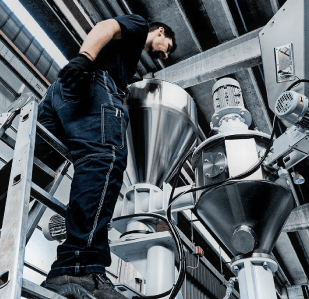In Brief
Industry 4.0 represents the fourth industrial revolution, characterized by the integration of advanced digital technologies into manufacturing processes. It focuses on the use of cyber-physical systems, the Internet of Things (IoT), artificial intelligence, and data analytics to optimize production. The goal is to enhance efficiency, improve product customization, and facilitate machine communication and autonomy. Industry 4.0 radically transforms how factories operate, making them smarter and more connected.
What does Industry 4.0 mean?
Industry 4.0 consist of machines that are constantly interconnected with each other, capable of self-diagnostics and troubleshooting problems that arise during the business process. It is shown how the maintenance capacity of machines on themselves, thanks to IoT (Internet of Things), will be able to exceed that of human beings in terms of quality and speed. A company’s machines will be able to identify any critical issues in the production process and fix them independently. The mechanization will allow the adaptation of the production process to individual customers, making it extremely precise and specialized.
Moreover, the energy supply of future factories will be waste-free and maintained at the lowest possible cost thanks to new energy control and management.
The fourth industrial revolution will cause machines to play an even more fundamental role in production processes. The development is happening very fast and it is necessary for every potential business to be aware of the fourth industrial revolution risks and benefits .
Industry 4.0 applied to production
The key concept of Industry 4.0 relies on production being able to dynamically adapt to an ever-changing scenario and rapidly evolve to meet changing needs. To ride this trend, large volumes of data must be continuously collected both within and across individual machines and then communicated to the entire ecosystem for evaluation across the various levels of operational technology (OT) and information and communication technology (ICT).
The opportunities linked to the ability to collect and evaluate increasing amounts of data relate to:
- the digitization of all business and production processes
- the creation of industrial value
- the operation and maintenance of plants for greater efficiency and reliability
- the development of completely new business models.
Data is the first step in implementing a digital transformation in an agile and automated way. This process requires the networking of all machines and plants, as well as additional sensors and actuators extended to all locations of the plant.
Orquestra 4th industrial revolution pipes
Orquestra is the Bausano-developed implementation of Industry 4.0 applied to its extrusion lines. The integration of IoT systems and Bausano extrusion lines provides a short time-to-market production and compatibility with existing plants (revamping applications). Orquestra enables companies to:
- Perform continuous and real-time monitoring of production;
- Generate immediate reports and intuitive graphs on production performance (machinery status, waste, hours worked);
- Intelligently connect all the machines in the field and integrate them with the Orquestra web-based platform;
- Collect raw data and transform it into ready-to-use information;
- Have certified and correct data on which to base the analysis of its business and R&D activities
Innovative technologies are bound to become a model to be followed for the entire sector, designed to raise the quality standard of processes and of the final product, offering important strategic resources and new development opportunities:
- Monitor all extrusion parameters in real time also in remote mode;
- Program automatic synchronization for production, maintenance and diagnostics;
- Save the configuration of the memory module;
- Save the selected parameters, upon request or at preset intervals.
Predictive maintenance
Predictive maintenance for industry 4.0 and fourth industrial revolution pipes is a method of preventing asset failure by analyzing production data to identify patterns and predict issues before they happen. Until now, factory managers and machine operators carried out scheduled maintenance and regularly repaired extruders parts to prevent downtime.
Implementing industrial IoT technologies to monitor asset health, optimize maintenance schedules and gain real-time alerts to operational risks, allows manufacturers to lower service costs, maximize uptime and improve production throughput.
Nowadays, connected production is not an option, but a must.






